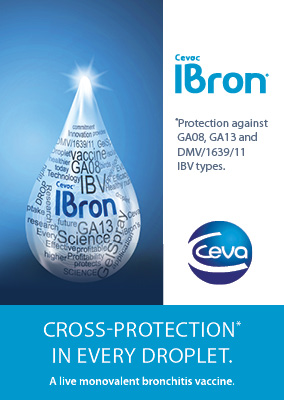 Day-old birds immunized with vaccines for Georgia (GA) and Massachusetts (Mass) serotypes of infectious bronchitis virus (IBV) were shown to be protected against four other circulating IBV variants in a recent study.
Day-old birds immunized with vaccines for Georgia (GA) and Massachusetts (Mass) serotypes of infectious bronchitis virus (IBV) were shown to be protected against four other circulating IBV variants in a recent study.
“There is a lot of good news here for poultry producers,” said Mark Jackwood, PhD, senior technical advisor at Ceva Animal Health, who presented results in a poster at the 2024 American Association of Avian Pathologists conference. (See p. 95 of the AAAP proceedings.)
“The vaccine combination we tested seems to do a really good job — not only to address the major IBV strains but also to address a number of the important variants that have been circulating.”
He added that while there are many commercially licensed vaccines available for managing IBV, rapid mutations of the virus have made it challenging for vaccine developers to keep pace with the serotypes (distinct variations) circulating in the field.
“If you don’t have a homologous vaccine available for the different strains you are seeing in your birds, the next best option is to vaccinate with more than one type of vaccine to try to get some cross-protection,” Jackwood continued. “This cross-protection strategy is what we investigated in our study.”
Tackling IBV
Infectious bronchitis is an acute, highly contagious upper respiratory-tract disease in chickens. Besides respiratory problems, it can cause decreased egg production and egg quality.
Nephritis — a condition where tissues of the kidney become inflamed — can be caused by some strains.
“IBV is always a chronic problem with poultry producers, and many struggle with protection strategies because it’s so prevalent and infectious,” Jackwood said.
“Biosecurity is not enough, however. You need to vaccinate against it to be able to control it. And since bronchitis changes so much in the field, it’s difficult to buy commercially available vaccines and vaccine combinations that offer a current and comprehensive solution.”
Knowing that some IBV vaccines have been shown to cross-protect against other serotypes, Jackwood and colleagues sought to examine results of a popular vaccination combination on a range of current important variants, including several for which there are no licensed vaccines.
Broadening protection
They tested a combination of two commercially available vaccines Cevac® IBron® and Cevac® IMass — administered by eyedrop at 1 day of age.
IBron is a live monovalent vaccine recommended for use in healthy chickens 1 day of age or older against bronchitis caused by Georgia 08 (GA/08) and Georgia 2013 (GA/13) when administered as a coarse spray and GA/08 and Delmarva 1639 2011 (DMV/1639/11) when applied as gel droplet by oral administration.
Ceva’s IMass is a live monovalent vaccine recommended for use in healthy chickens 1 day of age or older against bronchitis caused by the Mass serotype.
This vaccine regimen was tested against two IBV variants identified some time ago — Pennsylvania 1220 1998 (PA/1220/98) and California 1737 2004 (CA/1737/04) — that continue to circulate in commercial poultry, as well as two newer recently identified IBV variants, North Carolina Dark 2023 (NC/DARK/23) and the Canadian variant DMV/1639/23.
“Because many different antigenic variants can co-circulate in poultry with only a few vaccine types available, producers have historically combined different vaccine types to provide a broader cross-protective immunity,” Jackwood said.
“However, while anecdotal support has existed, little research-supported information has been available regarding the specific results of different vaccine combination regimens across different variants.”
Shedding new light
In the study, investigators vaccinated 40 specific-pathogen-free (SPF) chickens at 1 day of age and held them in poultry-isolation units. They left 40 additional birds unvaccinated to serve as positive-challenge control birds. Ten additional birds were not vaccinated and served as negative controls (no challenge).
At 5 days post-vaccination, investigators swabbed the choanal cleft of each bird and tested it for the presence of vaccine virus. They challenged the birds at 28 days post-vaccination with one of the four variants.
At 5 days post-vaccination, the GA/08 vaccine virus was detected in 100% of the vaccinated birds, and the Mass vaccine was detected in 92.6% of the vaccinated birds. All non-vaccinated birds were negative for vaccine virus at that time. All vaccinated birds seroconverted (produced antibodies in response to the vaccination) at 26 days post-vaccination.
At 5 days post-challenge, there was a statistically significant reduction in the amount of challenge virus detected between vaccinated and non-vaccinated birds challenged with the same virus. Specifically, investigators reported:
- A 2-log reduction (99%) in groups challenged with NC/Dark/23 and CA/1737/04.
- A 1-log reduction (90%) in the amount of challenge virus detected in the vaccinated group challenged with PA/1220/98.
- A 3-log reduction (99.9%) in the amount of challenge virus detected in the vaccinated group challenged with DMV/1639/23.
“Cross-protection for all four of the variants was confirmed based on fewer birds with clinical signs and a 1- to 3-log reduction in the amount of challenge virus compared to non-vaccinated challenge controls,” Jackwood summarized (Table 1).
“The knowledge we uncovered provides poultry veterinarians and producers with new information on the level of cross-protection this vaccine regimen can provide for each of these variants. Our study confirms this regimen has a lot to offer.”
Table 1. Number of birds with clinical signs per total observed at 5 days post-challenge
AA full dose of vGA08 and Mass vaccine was given by eyedrop at 1 day of age according to the manufacturer’s recommendations.
BThe number of birds with moderate to severe respiratory signs per total in each group. Clinical signs were scored and there was a statistical difference (p < 0.05) between vaccinated and non-vaccinated birds receiving the same challenge virus.
Key observations
The advantages shown for each of the four variants were significant, Jackwood said.
Pennsylvania and California variants. The PA and CA serotypes are known to share some similarities, most notably that both are relatively mild challenge viruses that typically only cause mild disease, Jackwood noted.
“The Pennsylvania virus is most often found in birds in larger facilities, and you’ll see some significant drops in production associated with it,” he reported. “The California virus is similar and has been unique to California where it has been becoming more widespread.”
In the study, Jackwood and colleagues found that vaccinated birds showed lower virus prevalence and zero clinical signs when challenged with these two variants. “It was clear the vaccine combination worked very well [against these variants],” he added.
Canadian variant. A version of DMV/1639 isolated in Canada, known as DVM/1639/23, is being monitored closely by the US poultry industry, Jackwood said.
“In our study, we wanted to get a better handle on what we can expect with this variant,” he added. “We confirmed that even though the Canadian variant is genetically a bit different from our US variants, our vaccine regimen worked well to address it, with 100% protection in clinical signs and lowered amount of challenge virus.
“Our IBron vaccine already has a license claim for DMV/1639. We wanted to make sure it would protect against DMV/1639/23, and it did.”
North Carolina Dark isolate. The fourth variant is a unique IBV to date found only in one region in North Carolina, Jackwood noted. “This isolate emerged from a recombination event involving a classical IBV, DMV/1639 and a new Arkansas IBV. Our team was previously able to isolate it and test that it was pathogenic.”
In the study, the researchers confirmed this isolate of mostly DMV/1639 with a touch of Arkansas was effectively controlled with the regimen. “Our vaccine combination protected against it quite well, so we were happy with that result too.”
While IBV constantly evolves and solutions will need to keep up, the overall findings are very positive for today’s challenges, Jackwood said.
“We found our combination using GA/08 and Mass-type IBV vaccines delivers effective cross-protection against several of the most relevant antigenic variant viruses currently circulating in poultry in the US and Canada.”
Editor’s note: Content on Modern Poultry’s Industry Insights pages is provided and/or commissioned by our sponsors, who assume full responsibility for its accuracy and compliance.








